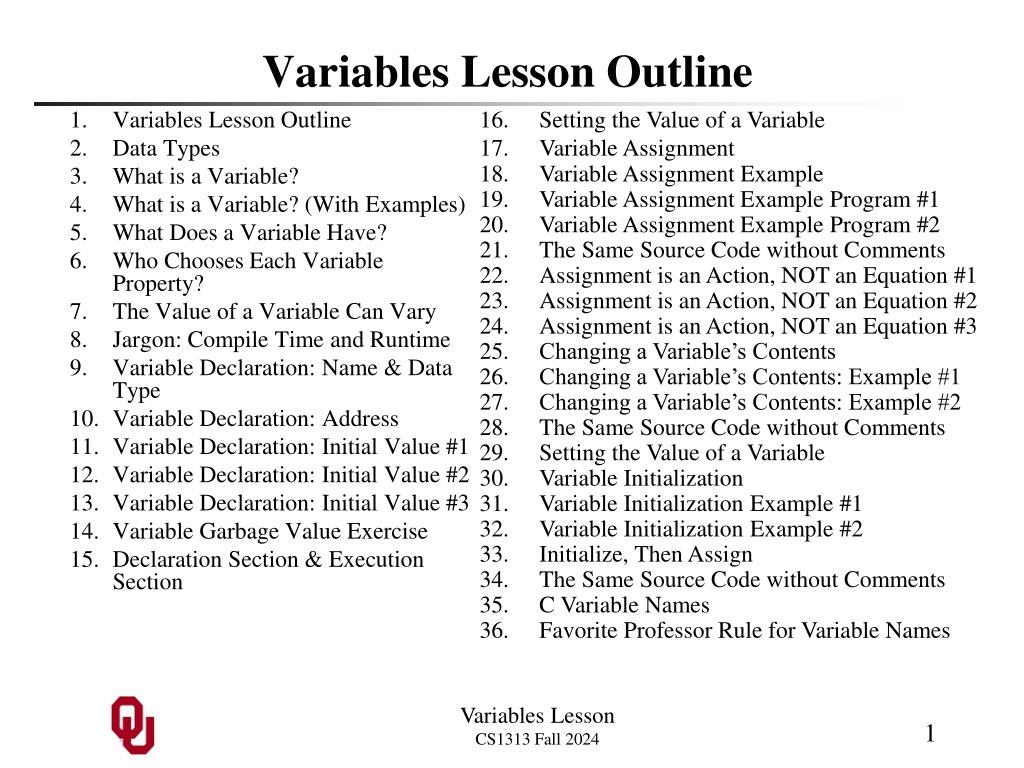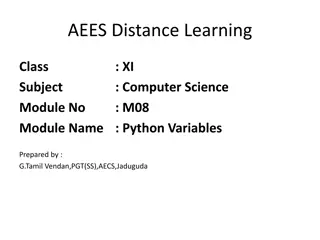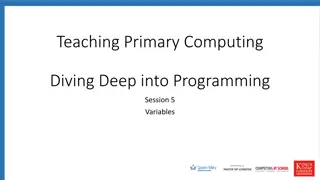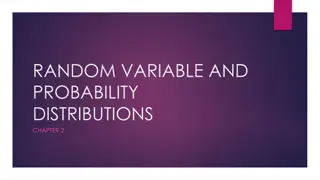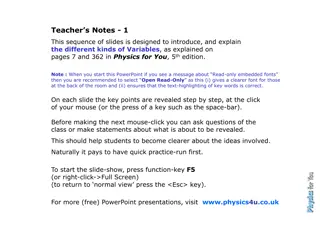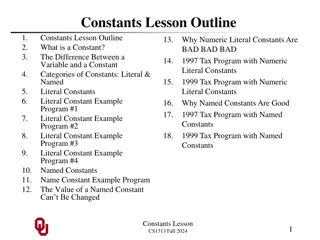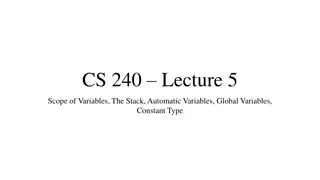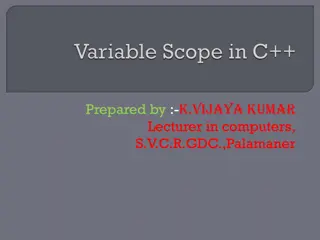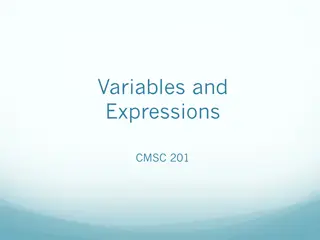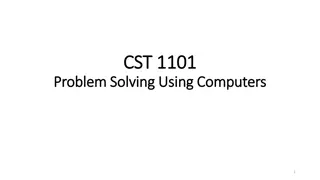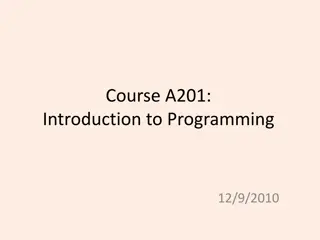Understanding Variables in Programming
Variables in programming are essential components that store data with specific properties such as name, address, data type, and value. This summary covers the basics of variables, their characteristics, declaration, initialization, assignment, and common conventions related to variable naming. It also delves into the concept of data types and their significance in programming. Understanding variables is crucial for writing efficient and structured code.
Download Presentation

Please find below an Image/Link to download the presentation.
The content on the website is provided AS IS for your information and personal use only. It may not be sold, licensed, or shared on other websites without obtaining consent from the author. Download presentation by click this link. If you encounter any issues during the download, it is possible that the publisher has removed the file from their server.
E N D
Presentation Transcript
Variables Lesson Outline 1. 2. 3. 4. 5. 6. Variables Lesson Outline Data Types What is a Variable? What is a Variable? (With Examples) What Does a Variable Have? Who Chooses Each Variable Property? The Value of a Variable Can Vary Jargon: Compile Time and Runtime Variable Declaration: Name & Data Type 10. Variable Declaration: Address 11. Variable Declaration: Initial Value #1 12. Variable Declaration: Initial Value #2 13. Variable Declaration: Initial Value #3 14. Variable Garbage Value Exercise 15. Declaration Section & Execution Section 16. 17. 18. 19. 20. 21. 22. 23. 24. 25. 26. 27. 28. 29. 30. 31. 32. 33. 34. 35. 36. Setting the Value of a Variable Variable Assignment Variable Assignment Example Variable Assignment Example Program #1 Variable Assignment Example Program #2 The Same Source Code without Comments Assignment is an Action, NOT an Equation #1 Assignment is an Action, NOT an Equation #2 Assignment is an Action, NOT an Equation #3 Changing a Variable s Contents Changing a Variable s Contents: Example #1 Changing a Variable s Contents: Example #2 The Same Source Code without Comments Setting the Value of a Variable Variable Initialization Variable Initialization Example #1 Variable Initialization Example #2 Initialize, Then Assign The Same Source Code without Comments C Variable Names Favorite Professor Rule for Variable Names 7. 8. 9. Variables Lesson CS1313 Fall 2024 1
Data Types A data type is (surprise!) a type of data: Numeric int: integer float: floating point (also known as real) Non-numeric char: character Note that this list of data types ISN T exhaustive there are many more data types (and you can define your own). #include <stdio.h> int main () { /* main */ float standard_deviation, relative_humidity; int count, number_of_silly_people; char middle_initial, hometown[30]; } /* main */ Variables Lesson CS1313 Fall 2024 2
What is a Variable? A variableis an association among: a name, an address, and a data type. Variables Lesson CS1313 Fall 2024 3
What is a Variable? (With Examples) A variableis an association among: a name (for example, number_of_students), an address (that is, a location in memory, such as 123456), and a data type (for example, int, float, char). Variables Lesson CS1313 Fall 2024 4
What Does a Variable Have? Every variable has: a name (for example, number_of_students), an address (that is, a location in memory, such as 123456), a data type (for example, int, float, char), AND a value, also known as the contentsof the variable specifically, the value is the contents of (what s inside) the variable s memory location. (The value might be undefined, also known as garbage more on this point soon.) Variables Lesson CS1313 Fall 2024 5
Who Chooses Each Variable Property? Every variable has: a name (for example, number_of_students), chosen by the programmer; an address (that is, a location in memory, such as 123456), chosen by the compiler; a data type (for example, int, float, char), chosen by the programmer; a value, sometimes chosen by the programmer, and sometimes determined while the program is running (at runtime), for example based on one or more inputs. (The value might be undefined, also known as garbage.) Variables Lesson CS1313 Fall 2024 6
The Value of a Variable Can Vary The value of a variable can vary; that is, it can be changed at runtime. We ll see how in a moment. Variables Lesson CS1313 Fall 2024 7
Jargon: Compile Time and Runtime Events that occur while a program is being compiled are said to happen at compile time. Events that occur while a program is running are said to happen at runtime. For example: the address of a variable is chosen at compile time; the value of a variable typically is determined at runtime. Variables Lesson CS1313 Fall 2024 8
Variable Declaration: Name & Data Type int x; Remember: A program is a description of (1) a collection of data and (2) a sequence of actions on that data. Before a program can use a variable, the program has to know (a) that the variable exists, (b) what the variable s name is, and (c) what type of data the variable can have. A declaration is a statement that tells the compiler all of these things: the variable exists, its name, and its data type. For example, the declaration statement above tells the compiler to choose a location in memory for a variable, name that variable x, and think of that variable as an int . Note that the declaration above doesn t specify a value for x. Variables Lesson CS1313 Fall 2024 9
Variable Declaration: Address int x; The compiler might decide that x will live at, say, address 3980 or address 98234092 or address 56436. We don t know, and don t care, what address x lives at, because the compiler will keep track of that for us. It s enough to know that x has an address and that the address of x will stay the same throughout a given run of the program. Variables Lesson CS1313 Fall 2024 10
Variable Declaration: Initial Value #1 int x; x: (address 56436) ???????? When x is first declared, we don t know what its value is, because we haven t put anything into its memory location yet, so we say that its value is undefined, or, informally, garbage. We ll see in a moment how to put values into our variables. Variables Lesson CS1313 Fall 2024 11
Variable Declaration: Initial Value #2 When x is first declared, we don t know what its value is, because we haven t put anything into its memory location yet, so we say that its value is undefined, or, informally, garbage. Note: Some compilers for some languages automatically initialize newly declared variables to default values (for example, all integers might get initialized to zero), but not every compiler does automatic initialization. You should NEVER NEVER NEVER assume that the compiler will initialize your variables for you. You should ALWAYS ALWAYS ALWAYS explicitly give values to your variables in the body of the program, as needed. Variables Lesson CS1313 Fall 2024 12
Variable Declaration: Initial Value #3 You can think of a variable s memory location as a box that always contains EXACTLY ONE THING AT A TIME. So, if you haven t put anything into the box yet, then the contents of that box is whatever was left in it when the previous user finished with it. You don t know what that value meant, so to you it s garbage. When you put your value into that box, the new value overwrites (or clobbers, meaning replaces) what was previously there. (1) (2) (3) 62 62 5 5 Variables Lesson CS1313 Fall 2024 13
Variable Garbage Value Exercise Think of an integer between 0 and 100 that is meaningful to you (for example, how many siblings you have, or your dog s age, or whatever). Take out a blank sheet of notebook paper (or share from a neighbor). Cut that sheet of paper in half, and then cut it in half again. (You can share the leftover quarter sheets with your neighbors.) On your quarter sheet of paper, write the integer you thought of. Fold your quarter sheet in half, and then fold it in half again. When everyone is ready, hand your foler quarter sheet to the person sitting to your left, but don t say anything. Let s see what happens! Variables Lesson CS1313 Fall 2024 14
Declaration Section & Execution Section The declaration section of a program is the section of the program that contains all of the program s declarations. The declaration section is always at the beginning of the program, just after the block open that follows the main function header: #include <stdio.h> int main () { /* main */ int height_in_cm; height_in_cm = 160; Declaration Section Body printf("My height is %d cm.\n", height_in_cm); } /* main */ The execution section, also known as the body, comes after the declaration section. Variables Lesson CS1313 Fall 2024 15
Setting the Value of a Variable There are three ways to set the value of a variable: assignment; initialization; input. Variables Lesson CS1313 Fall 2024 16
Variable Assignment An assignmentstatement sets the contents of a specific variable to a specific value: x = 5; This statement tells the compiler to put the integer value 5 into the memory location named x, like so: We say x is assigned five or x gets five. x: (address 56436) 5 (1) (2) 5 Garbage 5 Variables Lesson CS1313 Fall 2024 17
Variable Assignment Example int x; x: (address 56436) After x is declared, x has an undefined (garbage) value. ???????? x = 5; After executing the assignment statement x = 5; (pronounced x gets 5 or x is assigned 5 ), x has the vaule 5. 5 x: (address 56436) x = 12; After then executing the assignment statement x = 12; (pronounced x gets 12 or x is assigned 12 ), x has the value 12. 12 x: (address 56436) x = 5; /* We say "x gets 5" or "x is assigned 5." */ x = 12; /* We say "x gets 12" or "x is assigned 12." */ Variables Lesson CS1313 Fall 2024 18
Variable Assignment Example Program #1 % cat assign.c /* ********************************************* *** Program: assign *** *** Author: Henry Neeman (hneeman@ou.edu) *** *** Course: CS 1313 010 Fall 2024 *** *** Lab: Sec 014 Fridays 1:00pm *** *** Description: Declares, assigns and *** *** outputs a variable. *** ********************************************* */ #include <stdio.h> int main () { /* main */ /* * ****************************************** * Declaration section * ****************************************** * ******************* * Local variables * ******************* * * height_in_cm: my height in cm */ int height_in_cm; Variables Lesson CS1313 Fall 2024 19
Variable Assignment Example Program #2 /* ********************************************* * Execution section * ********************************************* * Assign the integer value 160 to height_in_cm. */ height_in_cm = 160; /* * Print height_in_cm to standard output. */ printf("My height is %d cm.\n", height_in_cm); } /* main */ % gcc -o assign assign.c % assign My height is 160 cm. Variables Lesson CS1313 Fall 2024 20
The Same Source Code without Comments % cat assign.c #include <stdio.h> int main () { /* main */ int height_in_cm; height_in_cm = 160; printf("My height is %d cm.\n", height_in_cm); } /* main */ % gcc -o assign assign.c % assign My height is 160 cm. Variables Lesson CS1313 Fall 2024 21
Assignment is an Action, NOT an Equation #1 An assignment is an ACTION, NOT an equation. height_in_cm = 160; An assignment statement means: Take the value on the right hand side of the single equals sign, and put it into the variable on the left hand side of the single equals sign. height_in_cm = 160; (The phrase single equals sign will make sense in a few weeks, when we start to talk about Boolean expressions. For now, ACCEPT IT ON FAITH.) Variables Lesson CS1313 Fall 2024 22
Assignment is an Action, NOT an Equation #2 An assignment is an ACTION, NOT an equation. #include <stdio.h> int main () { /* main */ int height_in_cm; height_in_cm = 160; printf("My height is %d cm.\n", height_in_cm); } /* main */ The assignment statement height_in_cm = 160; means put the int value 160 into the memory location of the int variable named height_in_cm. OR, height_in_cm gets 160. Variables Lesson CS1313 Fall 2024 23
Assignment is an Action, NOT an Equation #3 An assignment is an ACTION, NOT an equation it means do this, NOT this is the case. The variable whose value is being set by the assignment MUST appear on the left side of the equals sign. % cat not_an_equation.c #include <stdio.h> int main () { /* main */ int height_in_cm; ERROR! 160 = height_in_cm; printf("My height is %d cm.\n", height_in_cm); } /* main */ % gcc -o not_an_equation not_an_equation.c not_an_equation.c: In function main : not_an_equation.c:7: error: invalid lvalue in assignment Variables Lesson CS1313 Fall 2024 24
Changing a Variables Contents One way to change the value the contents of a variable is with another assignment statement. Variables Lesson CS1313 Fall 2024 25
Changing a Variables Contents: Example #1 % cat change.c /* *********************************************** *** Program: change *** *** Author: Henry Neeman (hneeman@ou.edu) *** *** Course: CS 1313 010 Fall 2024 *** *** Lab: Sec 014 Fridays 1:00pm *** *** Description: Declares, assigns, changes *** *** and outputs a variable. *** *********************************************** */ #include <stdio.h> int main () { /* main */ /* ******************************************** * Declaration section * ******************************************** * ******************* * Local variables * ******************* * * height_in_cm: my height in cm */ int height_in_cm; Variables Lesson CS1313 Fall 2024 26
Changing a Variables Contents: Example #2 /* ********************************************* * Execution section * ********************************************* * Assign the integer value 160 to height_in_cm. */ height_in_cm = 160; /* * Print height_in_cm to standard output. */ printf("My height is %d cm.\n", height_in_cm); /* * Assign the integer value 200 to height_in_cm. */ height_in_cm = 200; /* * Print height_in_cm to standard output. */ printf("My height is %d cm.\n", height_in_cm); } /* main */ % gcc -o change change.c % change My height is 160 cm. My height is 200 cm. Variables Lesson CS1313 Fall 2024 27
The Same Source Code without Comments % cat change.c #include <stdio.h> int main () { /* main */ int height_in_cm; height_in_cm = 160; printf("My height is %d cm.\n", height_in_cm); height_in_cm = 200; printf("My height is %d cm.\n", height_in_cm); } /* main */ % gcc -o change change.c % change My height is 160 cm. My height is 200 cm. Remember, a program is a collection of data and a SEQUENCE of actions. Variables Lesson CS1313 Fall 2024 28
Setting the Value of a Variable There are three ways to set the value of a variable: assignment; initialization; input. Variables Lesson CS1313 Fall 2024 29
Variable Initialization To initialize a variable means to declare it and assign it a value in the same statement: int x = 5; This statement is EXACTLY THE SAME as declaring x in the declaration section, and then IMMEDIATELY assigning it 5 at the beginning of the execution section. For example: int x; x = 5; means EXACTLY THE SAME as: int x = 5; Variables Lesson CS1313 Fall 2024 30
Variable Initialization Example #1 % cat initialize.c /* ********************************************* *** Program: initialize *** *** Author: Henry Neeman (hneeman@ou.edu) *** *** Course: CS 1313 010 Fall 2024 *** *** Lab: Sec 014 Fridays 1:00pm *** *** Description: Declares/initializes and *** *** outputs a variable. *** ********************************************* */ #include <stdio.h> int main () { /* main */ /* ****************************************** * Declaration section * ****************************************** * ******************* * Local variables * ******************* * * height_in_cm: my height in cm */ int height_in_cm = 160; Variables Lesson CS1313 Fall 2024 31
Variable Initialization Example #2 /* ****************************************** * Execution section * ****************************************** * * Print height_in_cm to standard output. */ printf("My height is %d cm.\n", height_in_cm); } /* main */ % gcc -o initialize initialize.c % initialize My height is 160 cm. Variables Lesson CS1313 Fall 2024 32
The Same Source Code without Comments % cat initialize.c #include <stdio.h> int main () { /* main */ int height_in_cm = 160; printf("My height is %d cm.\n", height_in_cm); } /* main */ % gcc -o initialize initialize.c % initialize My height is 160 cm. Variables Lesson CS1313 Fall 2024 33
Initialize, Then Assign You can initialize a variable in the declaration section, and then change its value in the execution section (body) via an assignment statement. % cat initialize_assign.c #include <stdio.h> int main () { /* main */ int height_in_cm = 160; printf("My height is %d cm.\n", height_in_cm); height_in_cm = 200; printf("My height is %d cm.\n", height_in_cm); } /* main */ % gcc -o initialize_assign initialize_assign.c % initialize_assign My height is 160 cm. My height is 200 cm. Variables Lesson CS1313 Fall 2024 34
C Variable Names C identifiers(including variable names) have the following properties: Constructed using only these characters: Letters(case sensitive: it matters whether it s upper case or lower case) a b c d e f g h i j k l m n o p q r s t u v w x y z A B C D E F G H I J K L M N O P Q R S T U V W X Y Z Digits 0 1 2 3 4 5 6 7 8 9 Underscore (NOTE: NOT hyphen) _ The first characterMUST be a letter or an underscore: a123_456 is good, and so is_a123456, but not 1a23_456 Variables Lesson CS1313 Fall 2024 35
Favorite Professor Rule for Variable Names A variable name should be so obvious that your favorite professor in your major, even if they know nothing about programming, could immediately tell what that variable name means. https://images.techhive.com/images/idge/imported/article/itw/2013/10/ 23/programmers_hardest_tasks-600x700-100521914-orig.jpg Variables Lesson CS1313 Fall 2024 36
